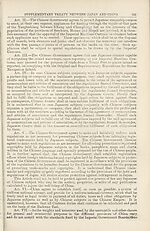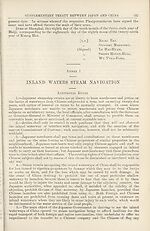1924
(192) Page 136
Download files
Complete book:
Individual page:
Thumbnail gallery: Grid view | List view

136
SUPPLEMENTARY TREATY BETWEEN JAPAN AND CHINA
resulting in detriment to the trade of Chinese and foreigners, the Governors-General
and Governors of all the provinces, after careful inquiry into existing conditions, shall
consult together and fix upon uniform standards which, after a Memorial to the
Throne for sanction, shall be adopted and used in all transactions by officials and
people throughout all the Empire. These standards shall be first used in the places
opened to foreign trade and gradually extended to inland places. Any differences
resulting from divergence between the new weights and measures and those, now in
vogue shall be equitably settled, whether by way of increase or decrease, according
to the amount of such difference. , ,
Art. VIII.—The Regulations for Steam Navigation Inland of the fifth moon of
the twenty-fourth year of KuangHsu and the Supplementary Rules of the seventh moon
of the same year, having beqn found in some respects inconvenient in working, the
Chinese Government hereby agrees to amend them, and to annex such new Rules to
this Treaty. These Rules shall remain in force until altered by mutual consent.
Art. IX.—The provisions of all Treaties and engagements now subsisting between
Japan and China, in so far as they are not modified or repealed by this Act, are
hereby expressly stipulated in addition, that the Japanese Government, officers,
subjects, commerce, navigation, shipping, industries and property of all kinds shall
be allowed 1'ree and full participation in all privileges, immunities and advantages-
which have been or may hereafter be granted by Eis Majesty the Emperor of China
or by the Chinese Government or by the Provincial or Local Administrations of
China to the Government, officers, subjects, commerce, navigation, shipping, in¬
dustries or property of any other nation. The Japanese Government will do its
utmost to secure to Chinese officers and subjects resident in Japan the most
favourable treatment compatible with the laws and regulations of the Empire.
Art. X.—The high contracting parties hereto agree that, in case of and after
the complete withdrawal of the foreign troops stationed in the province of Chihli and
of the Legation guards, a place of international residence and trade in Peking will be-
forthwith opened by China itself. The detailed regulation relating thereto shall be
settled in due time after consultation. The Chinese Government agrees to open to
foreign trade, within six months from the exchange of the Ratifications of this
Treaty, Ch‘angsha-fu in the province of Hunan, on the same footing as the ports
already opened to foreign trade. Foreigners residing in this open port are to observe
the Municipal and Police Regulations on the same footing as Chinese residents, and
they are not to be entitled to establish a Municipality and Police of their own within,
the limits of this Treaty Port, except with the consent of the Chinese authorities.
The Chinese Government agrees that, upon the exchange of the Ratifications of
this Treaty, Moukden and Tatungkow, both in the province of Shengking, will be-
opened by China itself as places of international residence and trade. The selection
of suitable localities to be set apart for international use and occupation and the regula¬
tions for these places set apart for foreign residence and trade shall be agreed upon,
by the Governments of Japan and China, after consultation together.
Art. XI.—The Government of China having expressed a strong desire to reform
its judicial system and to bring it into accord with that of Japan and Western
nations, Japan agrees to give every assistance to such reform, and will also be pre¬
pared to relinquish its extraterritorial rights when satisfied that the state of the
Chinese laws, the arrangements for their administration, and other considerations
warrant it in so doing.
Art. XII.—The present Treaty is signed in the Japanese, Chinese and English
languages. lu order, however, to prevent future discussions, the Plenipotentiaries of
the high contracting parties have agreed that in case of any divergence in the in¬
terpretation between the Japanese and Chinese texts of the Treaty, the difference
shall be settled by reference to the English text.
Art. XIII.—The present Treaty shall be ratified by His Majesty the Emperor of
Japan and His Majesty the Emperor of China, and the ratifications thereof shall be
exchanged at Peking a,s soon as possible, and not later than six months from the
SUPPLEMENTARY TREATY BETWEEN JAPAN AND CHINA
resulting in detriment to the trade of Chinese and foreigners, the Governors-General
and Governors of all the provinces, after careful inquiry into existing conditions, shall
consult together and fix upon uniform standards which, after a Memorial to the
Throne for sanction, shall be adopted and used in all transactions by officials and
people throughout all the Empire. These standards shall be first used in the places
opened to foreign trade and gradually extended to inland places. Any differences
resulting from divergence between the new weights and measures and those, now in
vogue shall be equitably settled, whether by way of increase or decrease, according
to the amount of such difference. , ,
Art. VIII.—The Regulations for Steam Navigation Inland of the fifth moon of
the twenty-fourth year of KuangHsu and the Supplementary Rules of the seventh moon
of the same year, having beqn found in some respects inconvenient in working, the
Chinese Government hereby agrees to amend them, and to annex such new Rules to
this Treaty. These Rules shall remain in force until altered by mutual consent.
Art. IX.—The provisions of all Treaties and engagements now subsisting between
Japan and China, in so far as they are not modified or repealed by this Act, are
hereby expressly stipulated in addition, that the Japanese Government, officers,
subjects, commerce, navigation, shipping, industries and property of all kinds shall
be allowed 1'ree and full participation in all privileges, immunities and advantages-
which have been or may hereafter be granted by Eis Majesty the Emperor of China
or by the Chinese Government or by the Provincial or Local Administrations of
China to the Government, officers, subjects, commerce, navigation, shipping, in¬
dustries or property of any other nation. The Japanese Government will do its
utmost to secure to Chinese officers and subjects resident in Japan the most
favourable treatment compatible with the laws and regulations of the Empire.
Art. X.—The high contracting parties hereto agree that, in case of and after
the complete withdrawal of the foreign troops stationed in the province of Chihli and
of the Legation guards, a place of international residence and trade in Peking will be-
forthwith opened by China itself. The detailed regulation relating thereto shall be
settled in due time after consultation. The Chinese Government agrees to open to
foreign trade, within six months from the exchange of the Ratifications of this
Treaty, Ch‘angsha-fu in the province of Hunan, on the same footing as the ports
already opened to foreign trade. Foreigners residing in this open port are to observe
the Municipal and Police Regulations on the same footing as Chinese residents, and
they are not to be entitled to establish a Municipality and Police of their own within,
the limits of this Treaty Port, except with the consent of the Chinese authorities.
The Chinese Government agrees that, upon the exchange of the Ratifications of
this Treaty, Moukden and Tatungkow, both in the province of Shengking, will be-
opened by China itself as places of international residence and trade. The selection
of suitable localities to be set apart for international use and occupation and the regula¬
tions for these places set apart for foreign residence and trade shall be agreed upon,
by the Governments of Japan and China, after consultation together.
Art. XI.—The Government of China having expressed a strong desire to reform
its judicial system and to bring it into accord with that of Japan and Western
nations, Japan agrees to give every assistance to such reform, and will also be pre¬
pared to relinquish its extraterritorial rights when satisfied that the state of the
Chinese laws, the arrangements for their administration, and other considerations
warrant it in so doing.
Art. XII.—The present Treaty is signed in the Japanese, Chinese and English
languages. lu order, however, to prevent future discussions, the Plenipotentiaries of
the high contracting parties have agreed that in case of any divergence in the in¬
terpretation between the Japanese and Chinese texts of the Treaty, the difference
shall be settled by reference to the English text.
Art. XIII.—The present Treaty shall be ratified by His Majesty the Emperor of
Japan and His Majesty the Emperor of China, and the ratifications thereof shall be
exchanged at Peking a,s soon as possible, and not later than six months from the
Set display mode to:
![]() Universal Viewer |
Universal Viewer | ![]() Mirador |
Large image | Transcription
Mirador |
Large image | Transcription
Images and transcriptions on this page, including medium image downloads, may be used under the Creative Commons Attribution 4.0 International Licence unless otherwise stated. ![]()
| Asian directories and chronicles > 1924 > (192) Page 136 |
|---|
| Permanent URL | https://digital.nls.uk/196426426 |
|---|
| Attribution and copyright: |
|
|---|---|
| Description | Volumes from the Asian 'Directory and Chronicle' series covering 1917-1941, but missing 1919 and 1923. Compiled annually from a multiplicity of local sources and research. They provide listings of each country's active corporations, foreign residents and government agencies of all nationalities for that year, together with their addresses. Content includes: various treaties; coverage of conflicts; currencies and taxes; consular fees; weights and measures; public holidays; festivals and traditions. A source of information for both Western states and communities of foreigners living in Asia. Published by Hongkong Daily Press. |
|---|---|
| Shelfmark | H3.86.1303 |
| Additional NLS resources: |

